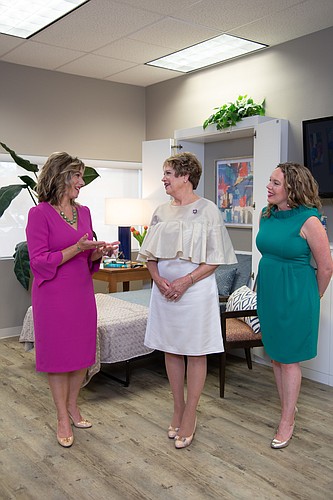- December 25, 2024
-
-
Loading

Loading

Company: Sue Wise, a registered nurse, founded Take Care in 1995. She had seen a big gap in the region in private duty home health care that put a premium on both top-flight care and white-glove customer service. The three daughters Wise was raising with her husband, area commercial real estate broker Carl Wise, were then teenagers. “I didn’t have any vision of this is being a family business,” says Wise, 66. “At no point did I consider that any of my daughters would come into the company.”
Yet that’s exactly where two of those daughters, Courtney Wise Snyder and Erika Wise Borland, ended up. Althgouh neither daughter pursued the family business when they were kids, both recall wanting to copy their mom when they were younger, watching her build a company from scratch. Now Wise Snyder, 40, is president, and Wise Borland, 38, is vice president. Wise Borland’s husband, Matt Borland, 35, is director of business operations, in charge of IT systems and projects.
The company, with 350 employees, including nearly 290 caregivers in the field, posted a 4% drop in revenue in 2020 over 2019. But although revenues dipped, the company paid overtime to caregivers working extra hours while others couldn’t due to a variety of reasons, awarded COVID-19 hardship bonuses, and compensated caregivers who obtained weekly and bi-weekly COVID-19 testing.
'The beauty in our succession plan is we’re not changing the core of what we do — providing clients with personalized, professional care.' Erika Wise Borland
Succession plan: Short of a concrete plan, the Wise family considers succession a looser process of delegation and leaning on the strengths of their team. The family has worked with business consultant Denise Federer on a succession plan — stopping for bit during the pandemic and recently restarting monthly meetings. “The idea of succession is so fluid — straight out of the box the idea is the next generation is trained and ready to go at a moments notice,” Wise Borland says. “Our approach is softer and more integrated and less obvious.”
“We are constantly doing succession planning,” Sue Wise adds, but it’s more focused on who will be doing what role or task than a title. “I see division of talent as part of what we are doing.”
Wise Borland, who brings marketing and business experience to the company, and Wise Snyder, with a focus on geriatric and clinical care, talk constantly about all aspects of the business. The sisters, who have been at Take Care 12 and 13 years, respectively, also consider training and employee retention a big piece of succession: At a company with more than 300 employees, the sisters know they need other leaders, nonfamily, to prosper. “It’s not realistic that both of us will know every in and out of the company,” Wise Snyder says.
“Everything Courtney and I do is to create solid practices and processes behind the scenes to ensure the continuity of culture with dedicated, honest and dependable team members,” Wise Borland adds.
Challenges: Wise Borland says the biggest succession challenge is time — taking the time to map it out, to think succession through. “It can be scary to start the actual planning,” she says. “The reality check to put the scenario and thought in one’s head to envision the founder, creator, inventor, idea-maker, not in the picture is something no one ever wants to do — at least not in a company where the family actually enjoys working together.”
Beyond time, another obstacle is what the younger Wise generation calls the "clone Sue Wise challenge." This is a founder, after all, who, in addition to handing out PPE and water bottles to caregivers in the beginning of the pandemic, writes five handwritten notes to employees — every day. She touches on everything from a check-in to a welcome to the company note to a congratulations on a client compliment.
“The beauty in our succession plan is we’re not changing the core of what we do — providing clients with personalized, professional care,” Wise Borland says. “Sue’s impression is absolutely a footprint, and there’s not a single employee at Take Care who hasn’t been a part of her influence — that impact is long-lasting and will continue.”
What will the company look like in five years: The core model and mission of Take Care will remain the same in 2026, the family says. Sue Wise, meanwhile, has no date in mind to retire. She has full confidence in her successors, yet she also has a passion for setting up Take Care employees to succeed — and doesn’t want to give that up. In some ways, being in the weeds like that goes against conventional succession wisdom, but for the Wise family it works. “In five years, in my heart I would like to be doing many of the same things that I’m doing today,” Wise says. “I still love to be in the business. That’s who I am. That’s what I love.”
Click the links below to hear best practices from other families working through business succession and experts who have helped others.